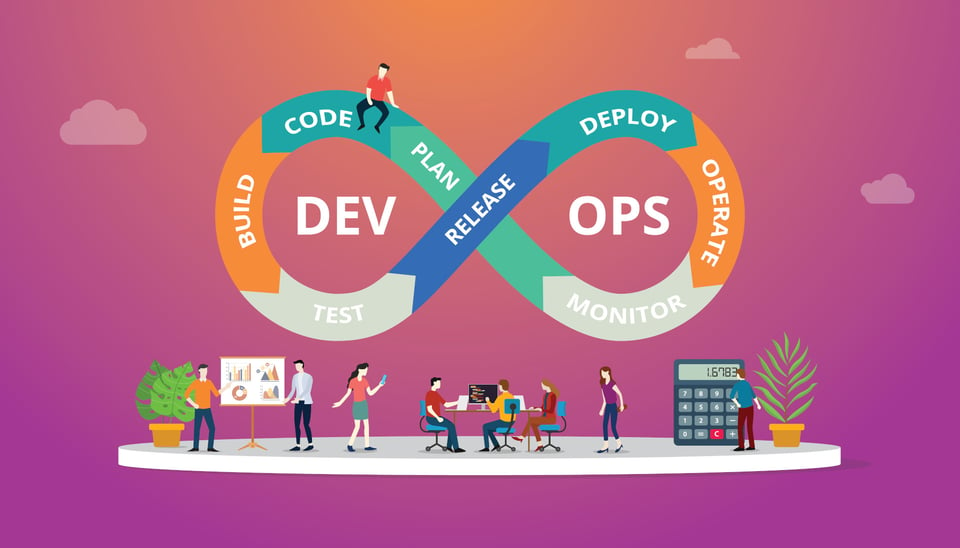How DevOps is Reshaping the Telecom Landscape
Introduction
Delivering seamless and reliable services is paramount in today's fast-paced and highly competitive telecom industry. With the ever-increasing customer demands, telecom companies continually seek ways to enhance their operational efficiency while providing cutting-edge services. One approach that has gained significant momentum in recent years is DevOps. This methodology focuses on collaboration and integration between software development and IT operations teams to streamline the development and deployment process. This article explores the significance of DevOps in the telecom sector and how it is transforming the industry.
Understanding the Telecom Industry
Before delving into the impact of DevOps, it is essential to grasp the complexities of the telecom industry. Telecommunications play a pivotal role in connecting people and businesses worldwide. However, the telecom sector faces numerous challenges, including rapidly evolving technologies, increasing data volumes, network congestion, and the demand for real-time services.
What is DevOps?

DevOps is a set of practices that promote seamless collaboration between development and operations teams, ensuring faster, more reliable software delivery. It encourages a cultural shift that prioritizes automation, continuous integration, continuous delivery (CI/CD), and continuous monitoring. By breaking down silos between teams, DevOps fosters a more agile and efficient development process.
Principles of DevOps
DevOps principles are built on four foundational pillars: culture, automation, measurement, and sharing (CAMS). These principles encourage teams to work collaboratively, automate repetitive tasks, measure performance, and share knowledge, enhancing productivity and innovation.
DevOps Workflow and Process
The typical DevOps workflow involves several stages: planning, coding, building, testing, deployment, monitoring, and feedback. Continuous integration and deployment allow rapid updates and bug fixes, reducing time-to-market for new features and services.
The Evolution of DevOps in Telecom
The adoption of DevOps in the telecom industry has been a gradual process. Initially, telecom companies faced challenges integrating traditional practices with DevOps methodologies. However, as the benefits became evident, more organizations embraced the DevOps culture.
Early Adoption and Challenges
Early adopters of DevOps faced challenges in transforming their organizational culture. Some hurdles were resistance to change, lack of cross-functional collaboration, and limited automation tools. However, the success stories of pioneering companies inspired others to explore DevOps further.
Benefits of DevOps in Telecom
The implementation of DevOps in telecom has resulted in various benefits. Telecom companies have reported improved product quality, shorter development cycles, faster issue resolution, and increased customer satisfaction. By embracing automation and continuous delivery, telecom operators can swiftly respond to market demands and stay ahead of competitors.
Implementing DevOps in Telecom Companies
To successfully implement DevOps, telecom companies need to cultivate a DevOps culture that emphasizes collaboration, innovation, and knowledge sharing. Adopting the right tools and technologies is crucial to enable seamless integration between development and operations teams.
Building a DevOps Culture
Creating a DevOps culture involves breaking down silos between teams and fostering an environment of trust and openness. Cross-functional teams collaborate from the initial stages of development to deployment, enabling better communication and faster decision-making.
Tools and Technologies for Telecom DevOps
Various tools and technologies are available to support DevOps practices in the telecom industry. Continuous integration tools like Jenkins and GitLab facilitate automated testing and code deployment. Containerization platforms like Docker and Kubernetes enable scalability and portability of applications.
Improving Telecom Services with DevOps
DevOps substantially improve telecom services by addressing key challenges the industry faces.
Enhancing Network Performance
DevOps methodologies facilitate real-time monitoring and quick identification of network issues, leading to faster resolution and improved network performance. Telecom operators can continuously measure and analyze network data to optimize their services to deliver better user experiences.
Ensuring Service Reliability and Availability
With DevOps, telecom companies can implement robust disaster recovery and redundancy measures, ensuring service availability even during outages or high traffic volumes. Automated failover systems and backup solutions help maintain uninterrupted service delivery.
Faster Deployment of Services and Updates
Traditionally, telecom companies underwent lengthy deployment processes for new services and updates. DevOps streamlines this process, allowing for rapid and automated deployment, reducing the risk of service disruptions and downtime.
Addressing Security and Compliance in Telecom DevOps
Given the sensitive nature of data and communications, security is a paramount concern in the telecom industry. DevOps practices help address security vulnerabilities and ensure compliance with industry regulations.
Securing Network Infrastructure
By incorporating security measures into the development process, DevOps teams can identify and address potential vulnerabilities early on. Regular security assessments and code reviews enhance the overall security posture of telecom services.
Regulatory Compliance Challenges
Telecom companies must comply with various regulations to protect user data and privacy. DevOps practices enable continuous monitoring and auditing, ensuring adherence to regulatory requirements.
Challenges and Pitfalls of Telecom DevOps
While DevOps offers numerous advantages, its implementation in the telecom sector is not without challenges.
Cultural Resistance to Change
Shifting to a DevOps culture requires a change in mindset and work practices. Some employees may resist these changes, which can hinder the adoption process. Effective change management and training are essential to overcome cultural resistance.
Integration and Compatibility Issues
Telecom companies often operate complex legacy systems that may not be compatible with modern DevOps tools and technologies. Integrating these systems with new DevOps practices can be challenging and time-consuming.
Overcoming Obstacles to Successful DevOps Implementation
To overcome these challenges, telecom companies must invest in employee training, leverage hybrid cloud solutions for seamless integration, and gradually phase out legacy systems.
Future Trends in DevOps for Telecom
The future of DevOps in telecom looks promising, with emerging trends that will further revolutionize the industry.
AI and Automation Integration
Integrating artificial intelligence and automation will drive predictive analytics, intelligent fault detection, and autonomous network management, optimizing telecom services.
Edge Computing and DevOps
As edge computing gains traction in the telecom sector, DevOps will be critical in managing distributed infrastructure and delivering low-latency services.
Synergizing Telecom and DevOps for Efficiency
Several telecom technologies can be related to DevOps in terms of how they align with its principles and methodologies:
Network Automation: Just as DevOps focuses on automating software deployment and infrastructure provisioning, network automation in telecom involves using tools to automate the configuration and management of network devices. This aligns with the DevOps principle of automating repetitive tasks to improve efficiency and reduce manual errors.
Software-Defined Networking (SDN): 5G networks are powered by software defined networks and virtualization. SDN separates the control plane from the data plane in networking, enabling centralized control and dynamic configuration of network resources. This parallels the DevOps concept of treating infrastructure as code, as SDN allows for programmatically defining and managing network configurations, leading to faster and more consistent deployments.
Virtualization: Telecom networks have increasingly adopted technologies like Network Function Virtualization (NFV) and Virtual Network Functions (VNFs) to create flexible and scalable network services. This relates to the DevOps goal of achieving infrastructure as code, where network functions can be deployed, scaled, and managed more agile and automated.
Continuous Integration and Continuous Deployment (CI/CD): In DevOps, CI/CD pipelines automate the process of building, testing, and deploying software changes. In telecom, these principles can be applied to network services, ensuring that changes to the network's configuration or services are tested, deployed, controlled, and automated, reducing the risk of service disruptions.
Microservices Architecture: Telecom services can be structured as microservices, which are small, independent components communicating through APIs. This architecture aligns with DevOps's modular and decoupled approach, allowing teams to develop, test, and deploy individual components independently while maintaining overall system reliability.
Monitoring and Observability: DevOps emphasizes monitoring and observability to gain insights into the performance of applications and infrastructure. In telecom, real-time monitoring of network traffic, quality of service, and other metrics is crucial for maintaining service availability and optimizing network performance, aligning with the DevOps focus on quickly identifying and addressing issues.
Infrastructure as Code (IaC): DevOps and telecom technologies promote the concept of IaC, where infrastructure configurations are defined through code. In telecom, IaC can be applied to network device configurations, ensuring consistency and reducing manual configuration errors, similar to how DevOps uses IaC to provision cloud resources.
Conclusion
DevOps has emerged as a game-changer in the telecom industry, transforming how companies develop and deliver services. DevOps enables telecom operators to meet customer demands effectively and stay competitive in a rapidly evolving market by fostering collaboration, automation, and innovation.
FAQs
What is DevOps, and how does it benefit the telecom industry?
DevOps is a set of practices that promote collaboration between development and operations teams, leading to faster software delivery and improved service quality in the telecom sector.
How does DevOps enhance network performance in telecom?
DevOps facilitates real-time monitoring and issue resolution, ensuring better network performance and user experiences.
What are the challenges of implementing DevOps in telecom companies?
Cultural resistance to change and compatibility issues with legacy systems are challenges faced during DevOps adoption.
Can DevOps help with regulatory compliance in the telecom industry?
DevOps practices enable continuous monitoring and auditing, ensuring compliance with industry regulations.
What are some future trends in DevOps for telecom?
The integration of AI and automation and the rise of edge computing are exciting trends shaping the future of DevOps in telecom.
Author Bio:
Adarsh Kumar Arya is a highly skilled Product Manager & Solution Sales Expert and an experienced technical writer passionate about communicating complex information clearly and concisely. With a strong background in Digital Technologies and a keen eye for detail, Adarsh excels in translating technical concepts into user-friendly documentation.


No comments yet